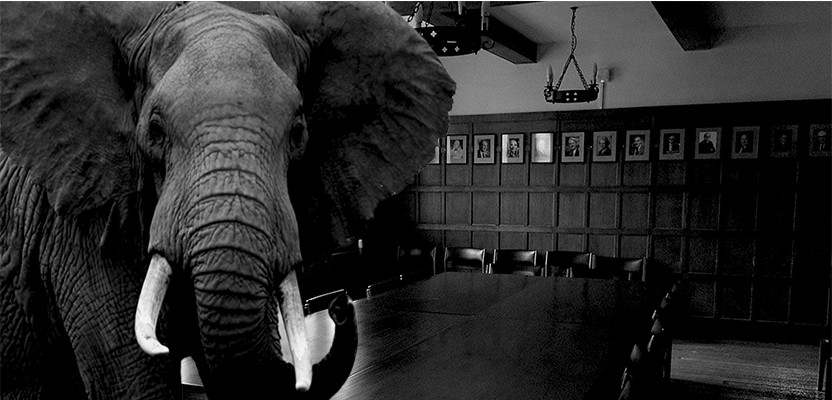Overcoming Confirmation Bias To Improve Business Outcomes
Of all the cognitive biases that affect business, confirmation bias might be the most insidious. It’s a challenge for many companies that can negatively impact performance. Smart C-Suites know this bias well, or so you would think. Confirmation bias is the human tendency to search for, favor, and use information that confirms one’s pre-existing views. It is an innovation killer. Confirmation bias eliminates free thinking and healthy questioning, becoming negatively endemic by encouraging accepted conformity in decision-making. It can affect many aspects of an organization, but most critically, it leads to unchallenged and often flawed strategic decisions—certainly, uninspired ones.
With the ability to affect all levels within an organization, confirmation bias can result in the two leading killers of creativity and ideation: what experts call Expert Think and Group Think. These are herd mentalities that perpetuate a lack of innovation and challenger thinking. This form of cognitive bias creates strategic blindness, and most businesses don’t have a way to recognize it’s happening. It’s hard to change something if you don’t know that there’s something to be changed.

Confirmation bias can significantly impact business decisions and processes. It leads individuals to selectively seek, favor, and use information that aligns with the safety of doing what has been done before. When business leaders fall victim to this bias, they may ignore contradictory evidence or overlook alternative solutions.
Confirmation bias stifles creativity and innovation. When leaders only seek data that confirms their existing beliefs, they miss out on novel ideas and disruptive solutions. If confirmation bias goes unchecked, it can lead to a lack of diversity in thought and perspectives. Companies become less inclusive when decision-makers surround themselves with like-minded individuals who reinforce their biases. A homogeneous workplace culture limits fresh insights, hinders collaboration, and ultimately affects overall performance. Combating confirmation bias requires conscious effort, open-mindedness, and a commitment to seeking diverse viewpoints.
Confirmation bias can be pervasive in organizations that insist on working with or hiring people only with specific vertical experience within their category. This serves only to reinforce biases. The result can be a category blindness that limits fresh, innovative thinking that challenges the status quo–which is typically how the big, disrupting ideas happen. And it happens all too often. “We’re looking for a strategist who has extensive experience in our category” which ensures narrow thinking. Sure, there is a sense of safety in making that request; as they say, no one ever got fired for hiring IBM. However, an experienced strategist’s domain expertise is not a particular vertical but in assessing dynamics, seeing clearly and objectively from 30 thousand feet, distilling data, and identifying insights that solve problems. Great strategists can do this in any category, and they bring that diversity with them.
Smart leadership knows the benefits of working with strategic talent that developed their skills in category-agnostic, diverse, integrated environments. More often than not, these are called “T” shaped people. The concept of T-shaped skills was popularized by David Guest in 1991, and it has been embraced by organizations seeking versatile and adaptable professionals. In the brand strategy world, T-shaped people combine deep strategic expertise with the ability to collaborate and adapt, bridge gaps between different areas, and contribute to interdisciplinary problem-solving and creativity. This diversity breeds innovation.
T-shaped people’s expertise is never about a specific category but rather an ability to analyze and strategize a business situation with speed and efficiency and apply unbiased, objective analysis to creative ideation to achieve desired outcomes. They are horizontal thinkers.
An outsider’s objective point-of-view is invaluable across most aspects of an enterprise, yet seeking and evaluating challenging perspectives is often not something businesses are comfortable doing or frequently aware they should do. Overcoming confirmation bias requires open-mindedness, a conscious effort, and a commitment to seeking diverse viewpoints. By doing so, you can make more rational and effective decisions for your organization. Conquering the challenge of confirmation bias relies on two things:
- Awareness. Confirmation bias exists to some extent in all organizations at all levels. Be mindful of the dangers and acknowledge that it can cloud judgment and inhibit innovation. Be aware of the need for diverse objectivity and analysis and the value of contradictory ideas and opinions that challenge convention.
- Leadership & Culture. Leadership must foster a culture that encourages challenging preconceived, dominant mindsets and embedded notions. Invite questioning. Aggressively seek out and leverage outside impartiality. Understand and embrace the inherent benefits of outside, unbiased opinions that may disagree with existing opinions
Equally important is not fearing challenging the status quo and not being afraid to listen, learn, and test new ideas and new directions. These ways of thinking are generally found in cultures where risk is encouraged, and a willingness to fail in the interest of better encourages creativity and trial. Welcoming an objective, unbiased set of eyes to the strategy table will undoubtedly bring fresh perspectives and new ideas. Be willing to embrace stepping out. Be a listener. Be a learner.
Great companies know that incorporating diverse points of view into the system allows staff to see things from different angles and create fundamental shifts in strategy. It also allows the organization to see things afresh and uncover a pivot in viewpoint that reveals alternative paths to increasing performance, market dominance, and equity value.
 It remains to be discovered whether an exercise in objective analysis will change the course of your business. However, it will definitively, whether challenged or confirmed, provide strategic clarity and confidence in the enterprise’s decision path. By fostering an environment that encourages critical thinking and challenges assumptions, businesses can mitigate the negative effects of this bias.
It remains to be discovered whether an exercise in objective analysis will change the course of your business. However, it will definitively, whether challenged or confirmed, provide strategic clarity and confidence in the enterprise’s decision path. By fostering an environment that encourages critical thinking and challenges assumptions, businesses can mitigate the negative effects of this bias.




